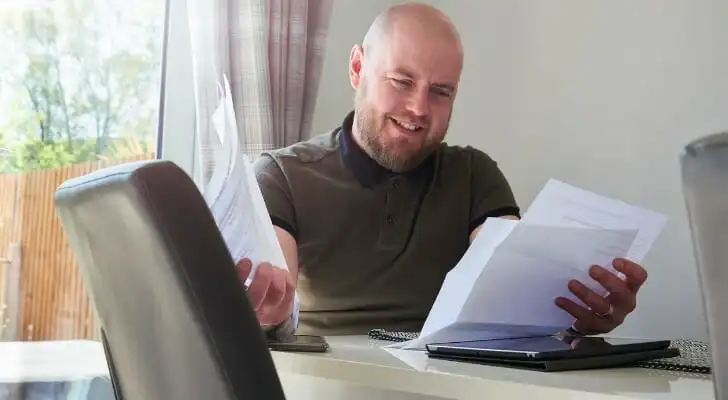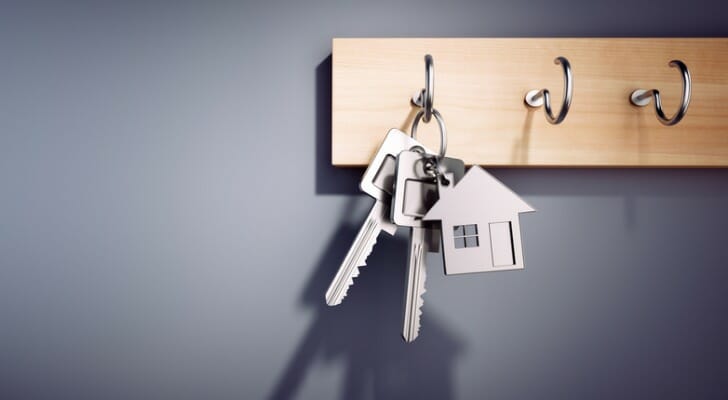If you own a home, it’s often thought that you should pay off your mortgage as quickly as possible. This is often advisable. A mortgage is frequently the largest amount of debt most people will ever owe, and even a terrific interest rate adds up quickly. So all things being equal, it often is wise to pay that off. However, if you urgently need to boost your retirement or emergency funds, or if you have corrosive debt like an unpaid credit card, it can make sense to delay paying off your mortgage. Here’s how to approach it.
Consider working with a financial advisor as you consider how best to handle your mortgage.
Why You Might Want to Pay Off a Mortgage
Don’t be fooled by the relatively small numbers. The interest rates on a mortgage involve enormous amounts of money. Nationally, the average mortgage is around $396,900. At the time of writing the average interest rate on a 30-year home loan was 6.95%. Your monthly payment on this mortgage would be $2,392.
Interest payments don’t reduce your debt or improve your finances. As far as your money is concerned, you might as well just set that cash on fire. In our example mortgage above, you’ll make that fixed payment of $2,392 every month for 30 years, but it will take 13 years before more of that payment applies to your principal than your interest. By the time you’re done you’ll have paid $261,533 on interest. The faster you can pay off your mortgage, the less money you’ll spend on interest. And when we’re talking about hundreds of thousands of dollars, this is a big deal.
As a result, financial advisors often recommend that homeowners pay down their mortgage as aggressively as possible. The faster you pay off this mortgage, the less money you will spend on interest. What’s more, paying off your mortgage will virtually eliminate your housing costs. From that point on, all you’ll have to worry about is a few thousand dollars per year in property taxes. You can move, or not move, as your lifestyle sees fit, but it will put you in the driver’s seat. In other words, if finances allow, it’s usually a very good idea.
Why You Might Not Want To Pay Off a Mortgage
All of that said, sometimes it might be a good idea to hold off on those early or extra payments. Paying off your mortgage early means dedicating extra cash each month to reducing your mortgage. Remember that your contract with the bank is a contract. It can’t increase your principal, and unless you have a variable interest rate it can’t increase your payments. This is a fixed, known expense that you can plan and budget for. There are four common rationales for not paying off your mortgage early.
1. Retirement Savings

This is probably the most compelling example. Most Americans don’t have enough saved for retirement, and sooner or later that will become a crisis for each household without enough money. This is particularly true if you’re in your 30s or 40s. With several decades left to build wealth in your IRA or 401(k), you still have enough time to build up a solid nest egg, but you need to get started now.
Make a retirement plan, then see where you are. If you need to make catch-up contributions, it might be very wise to prioritize those over accelerated mortgage payments.
2. Credit Cards and Student Loans
Unlike a mortgage, this is all unsecured debt. If you want to move, you can sell your house and (hopefully) use those proceeds to pay off the mortgage. Nothing short of bankruptcy can make credit card debt go away, and when it comes to student loans not even that.
Student debt, meanwhile, has average interest rates of between 4% and 7%. These are higher interest rates than most mortgages and often apply to five- or six-figures of debt. If you owe $90,000 at a 7% interest rate, it can erode your finances with breathtaking speed. The debt on a credit card compounds quickly, while a student loan is essentially like carrying a high-interest mortgage. Both are worth prioritizing.
3. Emergency Savings
The rule of thumb is that your emergency fund should have anywhere from four to six months’ worth of living expenses saved up in it. This is too ambitious for man people; saving up half a year’s income in cash is a big lift. However, you should be able to get by for a while in case of job loss, and you need to be able to handle unexpected expenses. This is particularly true if you’re a homeowner. You don’t want to get caught flat-footed if a pipe bursts or the roof starts to leak.
Like with your retirement account, make a plan. Identify an amount of emergency savings that you feel like you can realistically achieve, then begin to save up. It’s appropriate, indeed wise, to prioritize those savings over accelerated mortgage payments.
4. A Strong Market
If you have a low interest rate on your mortgage, it is very possible that no- or low-risk investments will offer better returns than the interest rate of your loan. For example, a market-indexed mutual fund or ETF is often considered a fairly low-risk investment when held over a long period. Month-to-month, the S&P 500 may fluctuate, but so long as you’re willing to hold your portfolio for years this is generally a very low-risk choice.
In a case like this, it is true that you will make more money by investing in the low-risk asset than you will save by paying off your mortgage early. For example, say you have a 3% interest rate on your mortgage and the S&P 500 is posting returns of 5%. Every dollar you spend on your mortgage will save you $0.03, but every dollar you invest in an index fund will gain you $0.05.
The index fund would come out ahead by $0.02 per dollar. Just keep in mind that long-term stock market returns can be fickle and your debt is fixed. The returns that you’re investing for today may not be as strong in 10 or 15 years, while your interest rate will tick away year by year.
Tips for Paying Off Your Mortgage
Regardless of when you decide to pay off your mortgage, there are some tricks you can implement to make sure you pay it off within your timeline. Here are some strategies, along with practical tips, to help pay down your mortgage faster, saving you both time and money:
- Biweekly payments: Instead of making monthly payments, consider switching to a bi-weekly schedule. This means paying half of your monthly mortgage every two weeks, resulting in 26 half-payments per year, or 13 full payments. This extra payment reduces the principal faster, cutting interest costs and shaving years off your loan.
- Extra principal payments: Whenever possible, make additional payments toward your principal. Whether it’s a lump sum from a tax refund, bonus, or even small monthly overpayments, these contributions directly reduce your principal balance. Over time, this strategy significantly lowers the overall interest paid and accelerates payoff.
- 15-Year mortgage: A 15-year mortgage generally comes with lower interest rates than 30-year loans which can help you save money in interest. Carefully consider your budget to see if you can afford the higher monthly payments. Use a mortgage prequalification calculator if you’re unsure.
- Prepayment: Some loans may include prepayment penalties, so review your loan agreement before proceeding. If no penalties exist, prepayment can be a cost-effective way to reduce your debt quickly.
- Refinance for a shorter term: If your financial situation has improved, consider refinancing your mortgage for a shorter term with better interest rates. This option can lower your interest rate and reduce the time it takes to pay off your mortgage.
- Round-up payments: Consider rounding up your monthly payments. For instance, if your payment is $1,865, round up to $1,900. These small amounts add up over time, reducing your balance and the interest you pay.
- Find side income: Consider taking up a side job or gig to supplement your income and put the extra earnings toward your mortgage. This approach requires dedication and time but can significantly impact.
- Recast the mortgage: A mortgage recasts one way to reduce your mortgage payments without completely adjusting the mortgage’s original terms, such as the interest rate and length. If you have a conventional Fannie Mae or Freddie Mac loan, consider recasting it if you want lower payments while still paying it off sooner than the remaining duration of your loan.
- Reevaluate budget periodically: Ensure you’re making the most efficient use of your financial resources by revisiting your budget regularly. Adjustments may allow for increased mortgage contributions.
Bottom Line
 Paying off your mortgage early is usually a good idea, but in some cases, you’re better off putting your money elsewhere. This is particularly true if you have urgent, unmet financial needs, such as catching up with retirement savings or paying down toxic debt. It’s also sometimes the case if you see an obvious type of arbitrage opportunity: a discrepancy between what can reasonably be expected from the stock market contrasted with your mortgage’s interest rate.
Paying off your mortgage early is usually a good idea, but in some cases, you’re better off putting your money elsewhere. This is particularly true if you have urgent, unmet financial needs, such as catching up with retirement savings or paying down toxic debt. It’s also sometimes the case if you see an obvious type of arbitrage opportunity: a discrepancy between what can reasonably be expected from the stock market contrasted with your mortgage’s interest rate.
Tips on Mortgages
- Are you thinking about buying a home? Be sure and work with a financial advisor to ensure you handle this big step wisely. Finding a financial advisor doesn’t have to be hard. SmartAsset’s free tool matches you with vetted financial advisors who serve your area, and you can have a free introductory call with your advisor matches to decide which one you feel is right for you. If you’re ready to find an advisor who can help you achieve your financial goals, get started now.
- Do not risk becoming “house rich.” This is the term for someone who has a valuable home, but because it soaks up all their money they have no cash on hand. Take a spin through our mortgage calculator to figure out how you can hit that perfect middle ground between a great home and great finances.
Photo credit: ©iStock.com/PeopleImages, ©iStock.com/MartinPrescott, ©iStock.com/peterschreiber.media
